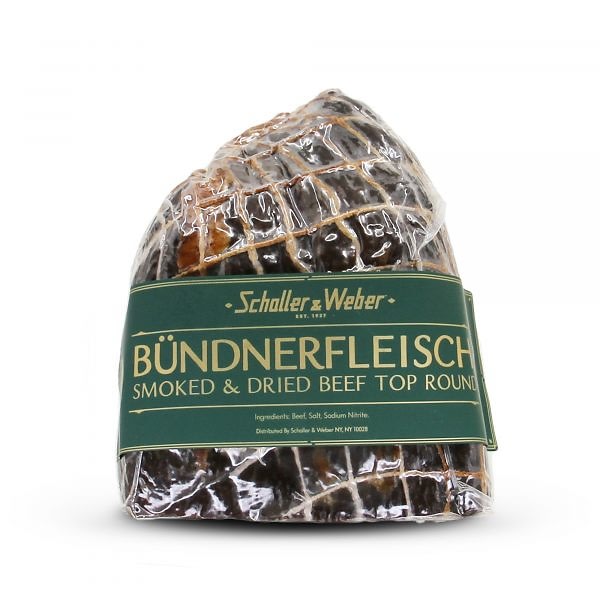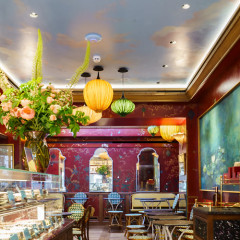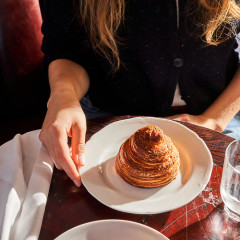.jpg)
Theoretically, creating a charcuterie board is easy. You just put some cured meats, funky cheese, and a handful of crackers on a serving board and voilà... right?
Well, as any good host or hostess knows, it's a bit more complicated than that. There's an art to everyone's favorite party platter, from determining the perfect ratio of meats to cheeses, to figuring out which flavors go best, and of course, nailing the presentation. And since charcuterie is typically served at the beginning of a party or get-together, it has the potential to make or break the entire evening. But hey, no pressure!
Thankfully, just in time for all your holiday entertaining, Jeremy Schaller, the third generation owner of old-school German market and butcher shop, Schaller & Weber, and its restaurant, Hütte, is here to share all of his professional plating tips. Trust, you'll be wearing the charcuterie crown of your friend group in no time.
.jpg)
When building a charcuterie and cheese board, Jeremy recommends selecting three types of meat and cheese each.
"The quantity should be based on the number of guests, always keeping a ratio of about 50:50 charcuterie to cheese to stay balanced. It’s always better to have more than you need – a skimpy board never looks impressive, and you may want to replenish or put out a fresh board if guests are arriving at different times.
Even as your party size increases, you don’t want to go overboard with too many varieties – quality over quantity is always key, and you should be able to give a basic description of the offerings on your board.
I’d say avoid mainstream brands and shop small businesses or local for better selection and quality – and don’t be afraid to ask for help in your selections. Prosciutto and soppressata are often overdone – look for more unique, small-batch selections to really impress."

Selecting meats: Instead of prosciutto Jeremy recommends a Bayonne ham – it’s a newer import of France, or Serrano ham, which is a Spanish ham with a nutty profile – both offer much more flavor and depth. Speck, a Northern Italian/Austrian dry-cured smoked ham is another great option when thinly sliced.
"Bündnerfleisch is a dry-aged cured top round beef – it’s a nice and unexpected addition to the board, and good to offer for those who don’t eat pork. It has a dark red color that also looks great to contrast against other items on the board."
A pate or foie gras is nice; adding a soft, creamy texture that can be served on a cracker. At Schaller, their newest addition is a Foie Gras with Truffles – made in conjunction with The Truffleist that has been an immediate favorite, and a great example of looking for unique combinations.
Selecting cheese – look for a variety of hard and soft selections.
"I love the Alpine Blossom, which is served at Hütte, an Austrian-pasteurized cow’s milk hard cheese with an impressive flavor and beautiful presentation with flowers in the cheese."
He recommends a ripened soft cheese, with a mix of milk like La Tur’s (which uses a blend of cow, goat, and sheep milk). As a third selection, he’d select a nutty dense selection like the Swiss Chällerhocker, with notes of caramel, or Reypenaer, a gouda from Amsterdam that slightly crystallizes as it ages, for interesting texture and flavor.
Crackers - While many people may think using a plain cracker is best, Jeremy says it’s better to go for one with flavor and personality of its own – he recommends Fine Cheese Co’s crackers, which add dried fruit and nuts to their crackers, for texture and sweet and savory flavors.
"Avoid basic crackers, they don’t add anything or elevate the board and they’re just not impressive. I love The Fine Cheese Co’s ‘Toast for Cheese’ which has apricots and pistachios in it."
Accompaniments are very important to bring the board together – both visually and for flavor.
"Cornichons are a must, sliced cucumbers and other fresh vegetables add a nice flavor and crunch, pickled onions can be very nice, and slices of fruit – I like to add pomegranate seeds for color and a burst of flavor to the board."
.jpg)
Jeremy also recommended adding jams, honey, and mustard. Nuts like walnuts or almonds can also add another layer of texture and flavor.
"At Hutte, we use dabs of jam like pear, raspberry, or lingonberry. For honey, look for an organic quality honey to offer on the side – charcuterie and cheese can be dipped and it brings out entirely new flavors for that salty-sweet combination. I also like to include a dollop of horseradish mustard, or Bavarian-style mustard.
You want to avoid anything like cream cheese, peanut butter or similar spreads, or other mainstream cheese spreads – they can really ruin the balance with heavy, overpowering and processed flavors."
Tips for serving:
"When serving, it’s best to let cheese breathe for about 30 minutes before enjoying. You want to wait and put out the meats when guests arrive for a perfect presentation – any sooner and they will begin to sweat. You’ll want to plate the pate or foie gras last."
[Photos via @schallerweber]


.jpg)
.jpg)



.jpg)
.jpg)
.jpg)



_amber_guinness.jpg)
